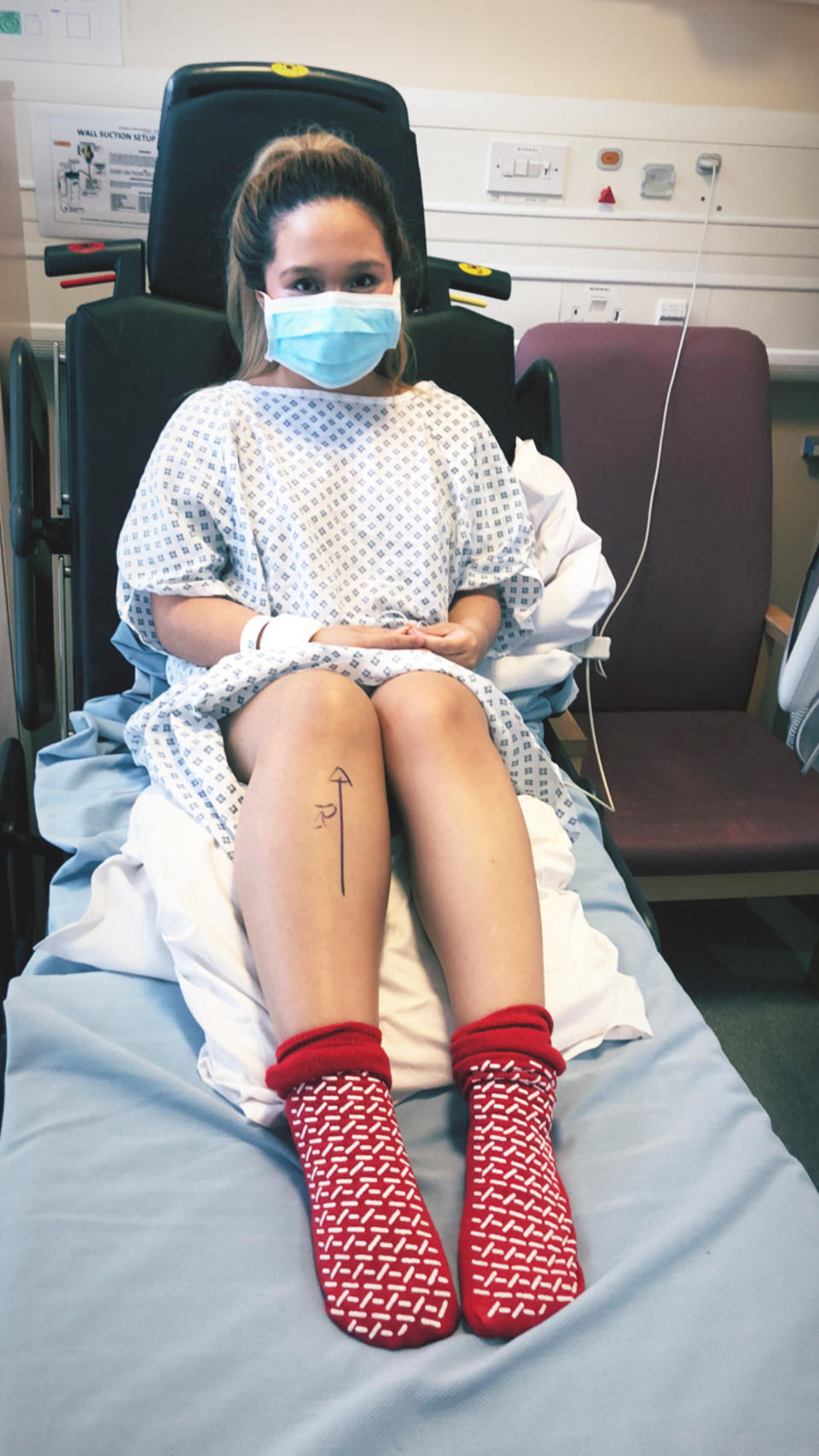Nurse has leg amputated after dismissing pain as cramps during coronavirus shifts
A nurse had her leg amputated to save her life after putting the pain of a tumour down to cramps caused by working long hours on the front line during the coronavirus pandemic.
Sette Buenaventura, 26, from Eccles, Greater Manchester, had been putting in 12-hour shifts when she noticed a throbbing in her right calf back in April.
Putting the pain down to her gruelling work schedule, she shrugged it off. But when it became a struggle to walk she decided to get it checked out.
Tests revealed Buenaventura had a sarcoma, a rare type of cancer, which within weeks had doubled in size to that of a golf ball.
The nurse was devastated to learn the only way to save her life was to amputate her leg from the top of her knee.
And just four weeks after being diagnosed, she was getting used to life with one leg.
“They told me the only way they could save my life was to remove my leg,” she says. “I was diagnosed in April and my leg was gone by May.
“There was just no time to worry about it, I just had to take in what they were saying and I just got on with it knowing that I didn’t have a choice.”
Read more: Girl, 10, made £50k from her floral paintings – and donated it all to charity

Buenaventura says the news came as a particular shock as she had always tried to maintain a healthy lifestyle.
“I was so upset, I like to look after myself and try to be healthy, I work in healthcare and never expected this to happen,” she says.
“It was a huge shock to the system because originally I was told I would just have surgery and be left with a scar, but in the time it took them to take scans of the rest of my body to check for spreading the original lump doubled in size.
“They told me that the only way they could save my life was to remove my leg from the top of my knee. It was a horrible feeling, but It all happened so fast that I didn’t really have time to process what was going on.
“I can’t look in the mirror now and don’t want to as it’s too much to acknowledge that what I’m seeing in the mirror is the new me.”

Buenaventura said she’d been suffering from the cramping pains in her leg for eight weeks before she told staff at Salford Royal Hospital.
“When COVID-19 kicked off we worked flat out, we didn’t have time to worry about aches and pains.
“That is what working in hospitals is like, you forget your own pains because you’re busy helping other people.
“I work in the stroke ward and usually get muscle cramp in my legs because I’m always on my feet.”
But when the cramp hadn’t got any better after eight weeks, Buenaventura was referred for an MRI, where her cancer was diagnosed.
She was diagnosed with a malignant peripheral nerve sheath tumour and within just a couple of weeks it grew to the size of a golf ball in her calf.
Doctors originally thought that it could be taken out surgically, but then they had to inform Buenaventura of the life changing amputation she would have to go through.
Thankfully, she is now cancer-free and hoping to be fully fit by the end of this month.
What’s more, if her rehabilitation runs smoothly, she could be back saving lives in November.

But despite making a good recovery, it has taken a while for Buenaventura to come to terms with losing her leg.
“I don’t want to be treated differently,” she explains.
“I hate people thinking that I need help all the time.”
She also admits to finding it “overwhelming” when she goes out and notices people staring.
“Even when I’m speaking to people, I can tell they are trying to be overly helpful and I understand why but I wish they wouldn’t,” she explains.
“Looking over Instagram and seeing all these models I try not to compare myself, but I can’t help it and knowing it’s a life I can’t get now is difficult.”
She is now focusing on helping to spread awareness and encouraging those concerned about an unexplained pain to seek medical help.
“It’s important for anyone with a lingering pain to get it checked,” she advises.
“If I had caught this sooner, I would probably be in a different position now.
“Although I won’t let this get in the way of my life goals, I feel now it has happened I should at least try to help stop it occurring in other people.
“It’s not the end of the world, but is all new to me, and I’m glad I have such great support from family and friends to help me get through this – and hope to help other people going through the same thing.”

Read more: Dame Julie Walters opens up about bowel cancer diagnosis
What are sarcomas?
According to the NHS soft tissue sarcomas are a group of rare cancers affecting the tissues that connect, support and surround other body structures and organs.
Tissues that can be affected by soft tissue sarcomas include fat, muscle, blood vessels, deep skin tissues, tendons and ligaments.
They can develop in almost any part of the body, including the legs, arms and tummy (abdomen).
Cancer Research UK says that soft tissue sarcomas do not usually cause symptoms in the early stages, but as sarcomas can grow anywhere in the body, the symptoms will depend on where the cancer is.
The main symptoms can include:
a lump that's painless at first
pain or soreness as the lump grows and presses against nerves and muscles
Treatments will depend on where the cancer developed, the type of sarcoma it is, how far it has spread, your age and your general health, but the main treatments are:
surgery to remove any tumour
radiotherapy – where high-energy radiation is used to kill cancer cells
chemotherapy and other medicines to kill the cancer cells.
Additional reporting Caters.




